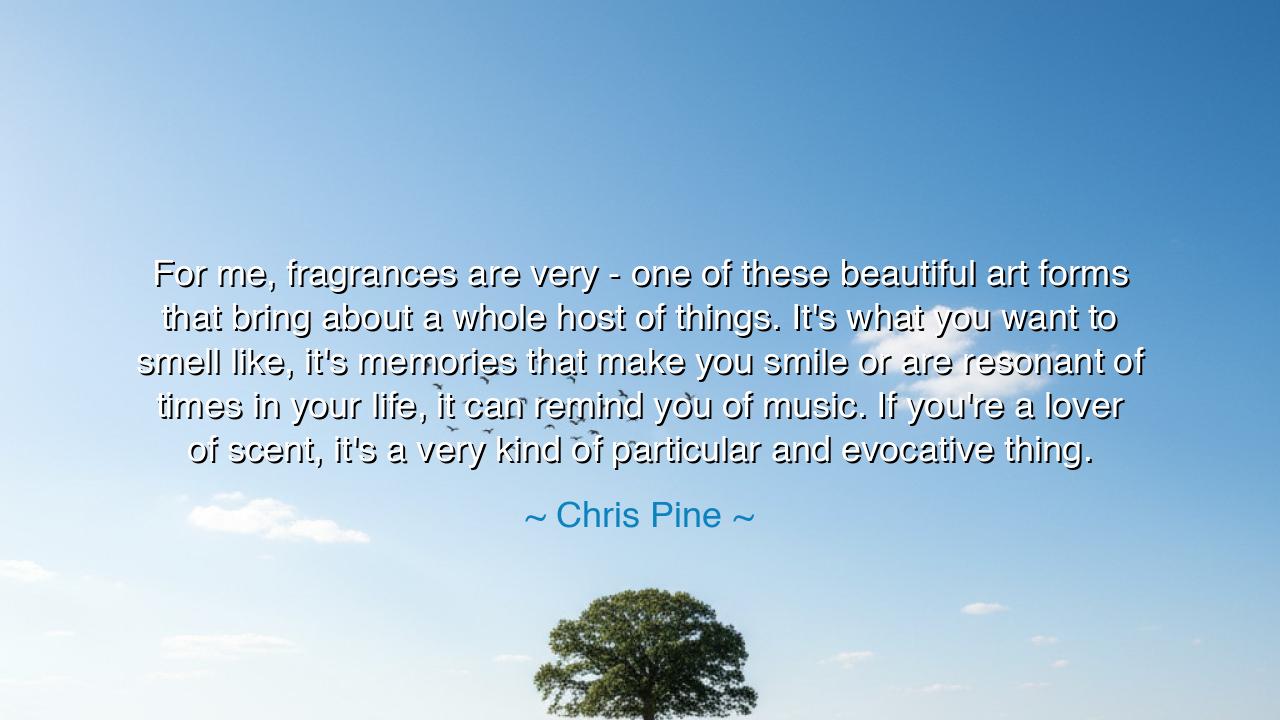
For me, fragrances are very - one of these beautiful art forms
For me, fragrances are very - one of these beautiful art forms that bring about a whole host of things. It's what you want to smell like, it's memories that make you smile or are resonant of times in your life, it can remind you of music. If you're a lover of scent, it's a very kind of particular and evocative thing.






The words of Chris Pine drift upon the air like the very subject they describe: “For me, fragrances are one of these beautiful art forms that bring about a whole host of things. It’s what you want to smell like, it’s memories that make you smile or are resonant of times in your life, it can remind you of music. If you’re a lover of scent, it’s a very particular and evocative thing.” In these lines, Pine names what sages and poets across centuries have known—that the power of scent transcends the body, reaching into the hidden vaults of memory and emotion, stirring the soul with mysteries unspoken.
To call fragrance an art form is to place it among the noble creations of humanity. Just as painting captures sight and music captures sound, so perfume captures the unseen breath of the world, distilling flowers, resins, and woods into an invisible tapestry. Unlike other arts, it does not stand before the eye but enters directly into the body, carried on the wind, seeping into memory. It is an art that cannot be looked at, but only lived—each breath becoming part of the one who receives it.
The bond between scent and memory is ancient and profound. The philosopher Pliny the Elder noted how certain perfumes were treasured not only for their rarity but for their ability to awaken recollections of feasts, ceremonies, or lovers long gone. Even today, the faintest whiff of a flower may transport one instantly across decades: a grandmother’s garden, a childhood festival, a lost embrace. Pine reminds us that this power is not trivial but deeply human—smell is the keeper of memory, the silent key that unlocks entire chapters of life in a single moment.
Consider how history bears witness to this truth. When Cleopatra prepared to meet Mark Antony, she is said to have perfumed the very sails of her ship, so that the wind itself carried her presence before she arrived. The fragrance was not decoration, but a declaration: power, allure, and memory fused into one. Antony would forever associate that scent with her, proof that perfume can wield the strength of armies, bending not only senses but destinies. Such stories reveal what Pine alludes to—that scent, like music, can echo in the soul long after the moment has passed.
Yet fragrance is not only memory, but also identity. Pine speaks of “what you want to smell like”—the deliberate choice of how one presents themselves to the world. Just as clothes are the armor of the body, so perfume is the aura of the spirit. A chosen scent declares mood, intention, and essence. It is the poetry of selfhood, whispered rather than shouted, subtle yet inescapable. To shape one’s scent is to shape one’s presence, to craft how the world will remember your passing.
The lesson, then, is profound: do not neglect the unseen. The things that cannot be touched or held—fragrance, music, memory, the unseen smile—often shape us more deeply than the visible. A life that honors these subtleties becomes rich with texture and depth. Just as a single drop of oil perfumes an entire chamber, so a single moment of beauty can transform the entire course of a day, or even a lifetime.
Therefore, practice awareness. When you encounter a scent, pause and listen to what memory it awakens. When you choose how you present yourself, consider not only what can be seen, but what can be felt and breathed. Seek out those fragrances, literal or symbolic, that bring joy, peace, and strength. And when they bring a smile, cherish it, for it is a gift from the unseen world to your heart.
Thus, Chris Pine’s words stand as a gentle teaching: that fragrance is not trivial adornment, but a sacred art form—one that binds memory, identity, and joy into a single breath. It is proof that the smallest, most delicate things can hold the greatest power, and that the invisible threads of scent weave together the tapestry of human life.






AAdministratorAdministrator
Welcome, honored guests. Please leave a comment, we will respond soon